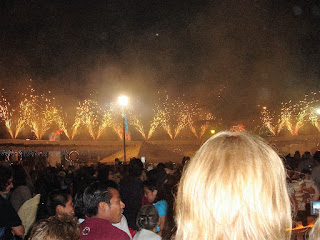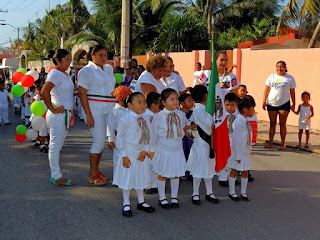 |
| Día de la Independencia |
Día de la Independencia in Mexico is celebrated annually on September 16th.
It is one of our favourite times of
year on the island. This
week is traditionally the start of the festivities leading up to the big finale
of this important national holiday,
featuring fireworks, flags, banners, music, dancing, and tasty food
washed down with cold beer or shots of tequila.
But this week’s blog is also about the other celebrations
that happen throughout the year. Many of
our Mexican friends don’t take the traditional two or three-week holiday that
we northerners are accustomed to, traveling someplace warm and exotic. Heck, they already live in that place; warm
and exotic. Why go anywhere else?
Like most countries, there are several different types of holidays in
Mexico: statutory (called feriados
or días de asueto), civic, religious, or family fiestas.
 |
| New Year, Año Nuevo |
To start the year off with a bang (pun intended), the
beginning of the New Year, Año Nuevo is an all-night fiesta in Centro with fireworks
and a twelve-piece band rocking the downtown area until dawn.
As the party winds down, many revelers will
make their way to Punta Sur at the southern end of Isla Mujeres. This is the first place in all of Mexico for
the first rays of sunlight to strike land, and celebrants in their party clothes
arrive by motos or golf carts, or private vehicles to toast the New Year. Government, banks, schools, and some stores
are closed on January 1st, which is probably a really good thing
after an all-night party.
 |
| Carnaval |
The next big national celebration,
Carnaval, takes place in late February or early March, depending on the date
set by the church calendar.
It is a full
five days of parades, dance contests, and silly behaviour until the beginning
of Lent on the following Wednesday.
This is the time of year that people really let loose.
It is not a statutory holiday, but it is one
of the best experiences in Mexico.
 |
| President Benito Juárez |
By the time the third Monday
in March rolls around, there is a quieter observance of the birthday of
President Benito Juárez, who was born March 21, 1806.
The day is usually marked with speeches and the laying of a floral wreath at his statue at the junction of the roads behind the
naval base and the end of the airport.
It is a statutory holiday, so banks, schools, and some stores will be
closed.
 |
| Day of the Flowery Cross |
On the 1st of
May is the Día del Trabajo or Mexico’s
Labor Day, commemorating the union movements of Mexican workers. On May 3rd, the Day of the
Flowery Cross is a separate observance just for construction workers.
Drive around the island, and you will see a
variety of decorated crosses adorning the rooftops of buildings under construction. The workers are usually treated to a hot
lunch and a half-day of work.
 |
| Día de la Independencia |
And forget your
misconceptions about Cinco de Mayo, as we mentioned earlier, September 16th
is the real Día de la Independencia, commemorating the beginning of its War of
Independence, led by the famous Father Miguel Hidalgo y Costilla in 1810. If you are in Mexico on September 15th sure
to make your way into Centro for the ‘Cry of Independence’ scheduled for eleven
in the evening, followed by fireworks, and another all-night fiesta. ¡Viva México!
 |
| Flowers and food for Día de Los Muertos |
Día de Los Muertos, the Day of the Dead (People)
begins on October 31st and includes November 1st, the Day
of the Dead for children, and November 2nd, the Day of the Dead for
adults. It is a 3000-year-old tradition
of remembering relatives and friends who have passed away. The historic tradition was integrated into
the Catholic Church rituals in the mid-1500s. Primarily a private family remembrance, the beautiful altars and
offerings have in recent years attracted a huge number of visitors to cities
such as San Miquel de Allende, and the City of Mexico. Here on Isla Mujeres, it is a very low-key celebration.
November 20th,
Día de la Revolución commemorates the start of the
Mexican Revolution by Francisco I. Madero in 1910. Observance
of this statutory holiday is on the third Monday of November. Most of the local school children participate
in a parade featuring very young mustachioed revolutionaries toting toy guns
and crossed banderillas of fake bullets. The kids are a delight to see, so serious and desperately trying to keep
in step for an interminably long parade.
 |
| One of the numerous celebrations |
Celebrated
chiefly in Mexico and the southwestern United States, Las Posadas begins on December
16th and ends on December 24th. The nine-day religious holiday honors the pilgrimage of Mary, Joseph, and the baby Jesus to
Bethlehem. In Mexico, the Aztec winter
solstice festival had traditionally been observed from December 7th to December
26th, marking the sun god Huitzilopochtli’s birthday.
 |
| Getting ready for the next New Year's Eve fiesta |
The parallel in time between this Aztec commemoration
and the birth of Christ lent itself to an almost seamless merging of the traditions
in 1586.
Traditionally, Navidad
or Christmas is observed on December 25th as a secular and a religious
holiday. People attend Mass, relax,
catch up with family and friends, and eat leftovers (recalentado)
from Christmas Eve’s
Noche Buena dinner.
And there are more, lots more celebrations! Come
join the fun!
¡Viva
México! Long live Mexico!
¡Hasta Pronto!
Lynda, Lawrie, Sparky, and Thomas the Cat
Or





No comments:
Post a Comment